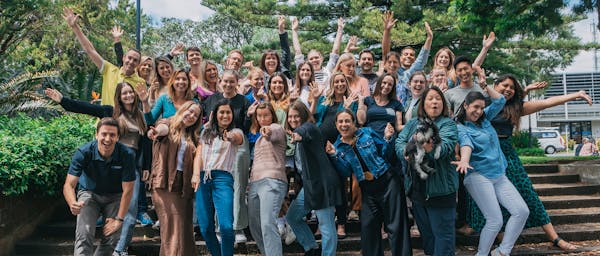Nobody will regret taking part in the Sustainable Agriculture project. Not only do you get to work outdoors everyday, you often get a real insight into family life and the daily jobs required to keep life going. From planting to seeds to cutting grass for the buffalo, this was one of the best experiences of my life.

Sustainable Agriculture Volunteer Program in Nepal
Purpose
Start dates
Duration
Volunteer hours
Age
Accommodation
Who is going?
Group video calls
Once you have secured your place, join regular video calls to meet your Program Manager and other volunteers before your trip.
This program is ideal for:
Physically fit volunteers who love the outdoors and don’t mind rolling up their sleeves to get involved in a variety of farming activities. Volunteers who have relevant experience may also introduce new ideas on how to manage farms from a business standpoint, with the aim of providing support to increase their financial stability and resiliency.
Project details
Interested in being a Sustainable Agriculture volunteer in Nepal? International Volunteer HQ’s Sustainable Agriculture project enables volunteers to assist a local family with small-scale farming tasks. Volunteers gain farming experience in a cross-cultural setting while helping to introduce newer farming techniques and agribusiness principles that can improve productivity, sustainability and financial security for the farmers, their families and the community.
What to expect and how you'll make an impact
In Nepal, nearly 70 per cent of the population earn a living by working in agriculture. However, many local farmers struggle to make a profit and produce an adequate supply of food for their communities.
As a Sustainable Agriculture volunteer, you’ll provide support to small-scale farmers, helping to improve livelihoods for farming communities and implementing more resilient practices. Volunteers are placed with a local farming family to provide assistance on a farm, learning traditional Nepalese techniques and practices while also introducing knowledge of newer farming methods and market opportunities. You can expect to be involved in tasks such as:
- Clearing land
- Cultivating and harvesting crops
- Caring for and moving livestock
- General farm maintenance
For those with prior knowledge or experience, there is also scope to introduce new ideas on how to manage the business side of farming and provide support to increase their financial security. Volunteers who want to help in this capacity should have basic knowledge in related subject areas, such as economics, agriculture, micro-enterprise, accounting, business or entrepreneurship.
Please keep in mind that there are two major festivals in Nepal and during these times there won’t be volunteer work available; but accommodation and all other services of the program will be available. The dates impacted are:
- 31st of October to 4th of November 2024 (Tihar Festival)
- 29th of September to 4th of October 2025 (Dashain Festival)
- 20th to 24th of October 2025 (Tihar Festival)
Why do Sustainable Agriculture volunteering in Nepal with IVHQ?
When you volunteer on farms in Nepal you’ll be adding value to the local community, while also developing personally and professionally by:
- Helping make farms more sustainable and resilient
- Introducing farmers to modern farming techniques
- Developing your communication skills
- Gaining farming and agribusiness experience
- Immersing yourself in Nepali culture
- Adventuring around Nepal’s amazing landscapes
Volunteer requirements
- Volunteers under the age of 16 must be accompanied by a parent or guardian to participate in this program
- Volunteers aged 16 or 17 on their program start date are required to provide IVHQ with parental consent in order to participate on the program, and may be asked to provide additional document to the local team.
- All volunteers aged 13+ are required to provide a criminal background check to IVHQ prior to departure. Those aged 13-17, if unable to obtain a criminal background check, can provide two character reference letters instead
- All volunteers are required to have adequate volunteer travel insurance
- All volunteers must speak fluent English.
Are you eligible to volunteer?
Submit a free application so we can confirm your eligibility and check availability for your preferred dates.
Not sure which program to join?
Get personalized recommendations >
Who is going?
Group video calls
Once you have secured your place, join regular video calls to meet your Program Manager and other volunteers before your trip.
Nepal photo gallery


























Academic course credit

Academic course credit
Gain course credit from your college or university and meet your academic requirements when completing a volunteer abroad program with International Volunteer HQ!
Learn about course creditLocation

Location
Land-locked in the middle of South Asia, Nepal is known for its astonishing alpine scenery and breathtaking mountainscapes. But this diverse country offers much more than its remarkable natural environment. Among Nepal’s 28 million people, there are more than 100 different ethnic groups speaking as many languages and following a large number of religious and cultural traditions. It also faces the challenges associated with a history of civil war, natural disasters, political corruption and a lack of resources and infrastructure to support its population.
Volunteers can have a meaningful impact on Nepalese communities by providing assistance with a wide range of activities that help make life, and the future, better for local people. IVHQ has a number of volunteer projects in Nepal. Some are located on the outskirts of the capital city of Kathmandu in rural and urban areas, while others are in Chitwan 150 kilometres away, in the middle of Terrai - a flat fertile plain that borders India and stretches right across Southern Nepal. Pokhara is located in mid-western Nepal and is a popular tourist destination, renowned for its amazing mountain views.
Arrival and orientation
The program orientation begins on the first and third Monday of each month, and volunteers need to arrive in Kathmandu on the Sunday before orientation.
After you have registered for the program, please book your flights to arrive at Tribhuvan International Airport (KTM) in Kathmandu. Your airport pick-up is included in your Program Fee.
When you arrive, you will be greeted at the airport by a member of the local team and transported to the volunteer accommodation in Kathmandu. Your accommodation is covered by your Program Fee and includes the night before your program orientation.
If you are traveling in Nepal prior to your volunteer program, we can arrange for you to be picked up at a prearranged destination in Kathmandu on the day before your program orientation.
Orientation is hosted by our Nepal team in Kathmandu and runs over the course of two days. Orientation begins on the morning of your chosen start date and covers everything you need to know for your volunteer program in Nepal – an introduction to Nepal, Nepalese customs, language training details, rules and expectations, safety, travel opportunities in Nepal, and an introduction to your project and placement. The orientation will also give you a chance to visit local temples, sample authentic Nepali food, meet other volunteers and swap contact details for weekend travel and socializing.
If you are placed in Pokhara or Chitwan, you will travel to your placement location on Tuesday afternoon and you will begin work on Wednesday. If you are located in Kathmandu, you will begin work on Wednesday.
Volunteer schedule example
First Day:
On your first day of volunteering, you will be escorted to your placement by a local coordinator and introduced to the placement staff you will be working with.
Weekdays:
While a volunteer daily schedule will vary depending on the specific placement, a typical day is as follows:
| 7:30 AM | Breakfast at the homestay. |
| 8:00 AM | Volunteers leave home and travel to their placements. There is usually a tea break and a lunch break. |
| 2:00 - 5:00 PM | Work at the placement usually ends. Volunteers are free to travel back to the volunteer house, go sightseeing, or do some shopping. |
| 7:00 - 9:00 PM | Dinner at the homestay. |
Weekends:
During the weekends, volunteers have spare time and usually relax or take the opportunity to explore other parts of their local town and Nepal. Known for being home to the world’s tallest mountain, Mt Everest, Nepal is an adventurer’s paradise. It has a vast selection of exceptional hikes in the Himalayas with arresting views in every direction, white-water rafting, canyon swings, paragliding and scenic flights. It also has a rich multicultural heritage and a huge collection of temples, pagodas, shrines, carvings and ancient architecture, not to mention an astonishing array of wildlife and an interesting cuisine influenced by its many ethnic groups and cultures.
Accommodation and WiFi
On arrival in Nepal, volunteers stay in a local hotel in Kathmandu for their two-day orientation.
Volunteers are then accommodated together in homestays and hosted by local families who have been approved by our program staff. We give your host family a fee for your support, food and board. It is exciting to stay with a host family, providing you with a unique opportunity to learn about the Nepalese way of life, meet local people, try traditional food and speak the local language - especially when host families in Nepal tend to have limited English.
Living is basic but comfortable and most homestays have electricity and running water, with the exception of some rural homestays which are without these conveniences during the dry season. Western toilets can be found at your home stays but please keep in mind that Squat toilets are still the norm in parts of Nepal; so you might find these at your placement and during activities, treks, etc. Volunteers can also expect low-pressure showers that are generally not heated, however, this is refreshing after a day in the heat.
You can expect to share a room with one to three other volunteers and bedrooms have single beds and bunk beds with bedding provided. It is recommended volunteers bring their own sleeping bag and mosquito nets for any trips away.
WiFi is available in most of the volunteer homestays, however those based in Chitwan should expect to walk to a nearby cafe for internet access. If you would like to keep connected during your stay, we recommend bringing an unlocked mobile phone and purchasing a local SIM card when you arrive in Nepal.
Meals
The staple meal for most Nepali families is dal bhat, which consists of lentil soup (dal), rice (bhat) and vegetables in curry (tarkari) and/or meat (masu) with a side of pickle/sauce (achar).
Food in Nepal is heavily influenced by the country’s Indian and Tibetan neighbours and includes plenty of curries, breads and potato-based dishes. Volunteers are served two meals per day at their homestay and can purchase additional food to supplement this if they wish.
Bottled water is readily available in Nepal and volunteers should budget approximately CA$7 per week for two liters a day. If you have any special dietary requirements, please let us know when you apply for the program so we can make arrangements for you. However, we need to stress the point that you should not expect to eat as you normally do at home. We will do our best to see that you are well taken care of, but there is a need to be flexible.




























Pricing
Spots are limited. For a Registration Fee of just US$299 (approximately CA$435) you secure your spot and unlock all our preparation and training tools.
You don't need to worry about paying your Program Fee until you get closer to your start date.
Duration |
Program FeeDue 30 days before you start, or within 48 hours if you register inside of 30 days. Covers the cost of hosting you.
|
|---|---|
| 3 weeks | $545 Equivalent to $26/day |
| 4 weeks | $675 Equivalent to $24/day |
| 5 weeks | $805 Equivalent to $23/day |
| 6 weeks | $935 Equivalent to $22/day |
| 8 weeks | $1,175 Equivalent to $21/day |
| 10 weeks | $1,415 Equivalent to $20/day |
| 12 weeks | $1,655 Equivalent to $20/day |
- All programs attract a Registration Fee of US$299 (approximately CA$435) in addition to the Program Fee. This covers all pre-departure support services.
- A 5% international banking fee is added at point of payment.
- Recommended spending money: Volunteers in Nepal generally find US$45 per week to be sufficient for expenses, such as lunches, transportation and local tours & activities.
- Daily breakfast and dinners
- Airport pick-up
- Accommodation
- 24/7 in-country emergency support
- In-country program orientation
- Pre-departure support from your Program Manager
- Personalized preparation tools, guides and check lists
- Access to IVHQ’s preferred insurance and flights partners
- Comprehensive in-country day to day support and guidance
- Discounts on travel and tour add-ons
- Certificate of International Volunteer Service
Learn more about what's included in your IVHQ Registration Fee and Program Fee.
- Daily lunches
- Transport to and from your placement each day
- Return to the airport when your program finishes
- Flights
- Visa (if required), travel insurance (mandatory), vaccinations, criminal background check.
- Personal spending money for snacks, laundry, public transportation, drinks and leisure activities during your free time.
Popular add-ons & experiences in Nepal
Take your volunteer experience to the next level with these popular add-ons and experiences. Explore your options below and learn how to book them once you've been accepted onto the IVHQ Nepal program.
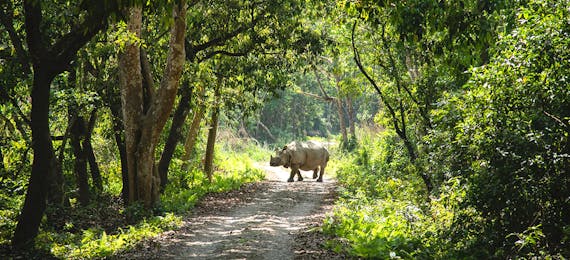
Embark on an unforgettable jungle safari to witness Nepal’s captivating wildlife in its natural habitat.
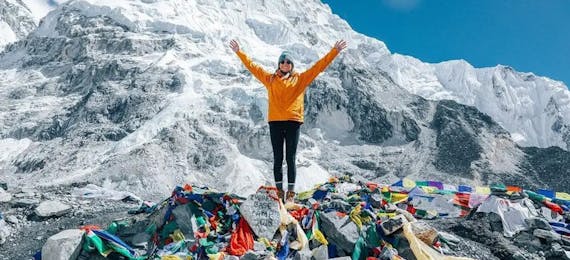
This iconic expedition is the most popular trekking route in the Himalayas and is unlike any other in the world.
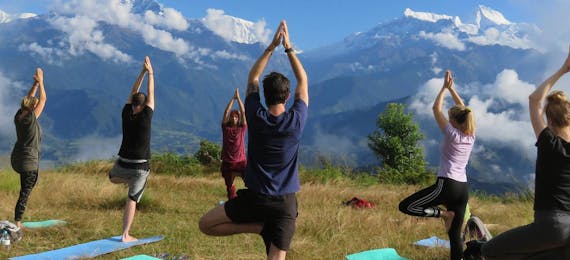
Reconnect with tranquility and mindfulness during a rejuvenating one-week yoga and meditation retreat, leaving behind the hustle and bustle of the Western world.
Check what's required to visit Nepal
Safety and support
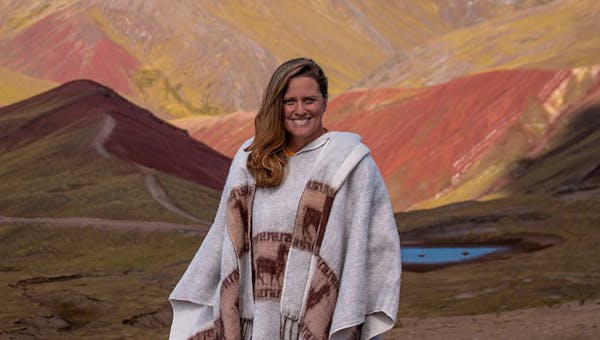
Safety and support
IVHQ follows best practice and industry-leading health and safety procedures, which are regularly reviewed and optimized as part of the B Corporation recertification.
- All volunteers encouraged to complete our interactive pre-departure training.
- All local teams trained on best practice volunteer management & First Aid.
- All IVHQ programs are required to adhere to IVHQ's Risk Management Policy.
- All volunteers have access to 24/7 in-country support from our local team.
Essential country information
Essential country information
| Capital | Kathmandu |
| Population | 28 million |
| Languages | Nepali |
| Currency | Rupee (NRs.) |
| Time zone | UTC+05:45 |
Weather and climate: The climate in Nepal varies largely due to the variations in geography across the country. Spring and autumn are the most pleasant seasons with dry weather and moderate temperatures. The Kathmandu Valley and other areas of high altitude experience summer temperatures of up to 28°C (82.4°F) and in winter, temperatures range between 2°C (35.6°F) and 20°C (68°F). The summer temperatures in Chitwan can reach up to 35°C (95°F) and in winter they range between 7°C (44.6°F) and a mild 23°C (73.4°F). The climate in Pokhara is similar to that of the Kathmandu Valley, with slightly warmer temperatures.
What recent volunteers said about their IVHQ experience
It was a great experience volunteering in sustainable agriculture. Being able to share and learn about the culture of the country through the families that receive us was the most incredible.
The pre-trip resources from IVHQ were detailed and prepared me well.
I have a few favorite moments, but I really enjoyed my time in Chitwan handling and caring for the Buffalo. I've never worked with livestock before, and it was a tough and thrilling experience. There were six Buffalo and I helped clean their pens and feed them. Another favorite moment was cultivating a few gardens in Pokhara and having to chase off monkeys. I have never experienced anything like that. That was also a tough and thrilling experience!
The biggest impact that this volunteer trip had on me was that it helped provide me with a deeper sense of independence. I've traveled alone throughout the U.S.A a few times, but I've never traveled alone internationally. It was extremely empowering, and I am very grateful that I was able to gain more knowledge about myself and traveling abroad.
Making yourself uncomfortable is the best way to grow and experience life, so travel as much as you can and to make a difference in the world while doing it. You won't regret it and you will feel extremely fulfilled.
To read all reviews, visit our reviews page.











































